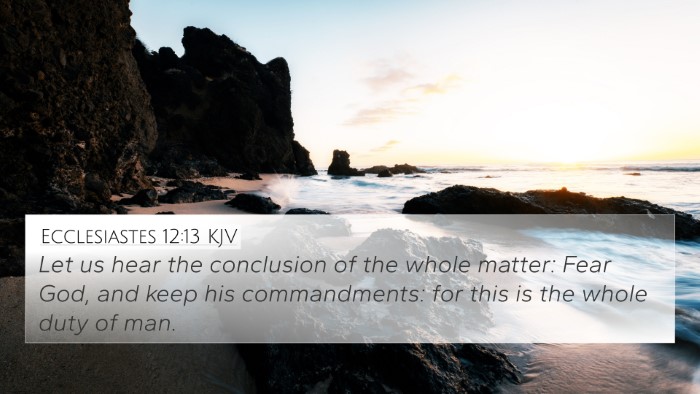Understanding Proverbs 3:7
Proverbs 3:7 states, "Be not wise in your own eyes: fear the Lord, and depart from evil." This verse emphasizes humility and the necessity of recognizing one’s limitations in wisdom, while calling on the fear of the Lord as the guiding principle in one's life.
Summary of Insights from Public Domain Commentaries
This verse is rich with meaning and invites deeper reflection. Insights from commentators like Matthew Henry, Albert Barnes, and Adam Clarke reveal several layers of understanding:
- Humility Acknowledged: According to Matthew Henry, being "wise in your own eyes" implies a self-reliance and pride that blinds individuals to God’s ultimate wisdom. This arrogance leads to straying from the path of righteousness.
- Divine Fear: Henry also highlights the importance of "fearing the Lord," which encompasses both awe and reverence. This fear is a productive fear that drives believers to live in accordance with God's will.
- Departing from Evil: Adam Clarke emphasizes the connection between fearing the Lord and the necessity of turning away from evil. Such a turning is not merely a moral choice but is framed as a result of a heart aligned with God.
- Practical Application: Albert Barnes points out that wisdom in God’s eyes is different from human wisdom. Thus, this verse is a reminder to seek divine wisdom, especially in ethical and moral matters.
- The Road to Wisdom: All commentators agree that the pathway to true wisdom passes through humility and the recognition of God’s authority.
Cross-References Related to Proverbs 3:7
To understand this verse more fully, we can link it to several other Bible verses that speak to the same theme of seeking God’s wisdom and recognizing our limitations:
- James 4:6: "But he giveth more grace. Wherefore he saith, God resisteth the proud, but giveth grace unto the humble." This reinforces the necessity of humility over pride.
- Proverbs 1:7: "The fear of the Lord is the beginning of knowledge: but fools despise wisdom and instruction." Establishing the foundation of wisdom begins with the fear of the Lord.
- Isaiah 55:8-9: "For my thoughts are not your thoughts, neither are your ways my ways, saith the Lord." This illustrates the vast difference between divine wisdom and human reasoning.
- Philippians 2:3: "Let nothing be done through strife or vainglory; but in lowliness of mind let each esteem other better than themselves." This verse advocates for humility akin to Proverbs 3:7.
- Psalm 111:10: "The fear of the Lord is the beginning of wisdom: a good understanding have all they that do his commandments." Again emphasizing the necessity of fear as the starting point for wisdom.
- Job 28:28: "And unto man he said, Behold, the fear of the Lord, that is wisdom; and to depart from evil is understanding." This connects the ideas of understanding and wisdom directly with the fear of God.
- Proverbs 3:5-6: "Trust in the Lord with all thine heart; and lean not unto thine own understanding. In all thy ways acknowledge him, and he shall direct thy paths." Another reminder of the dangers of self-trust.
Connections Between Bible Verses
These verses create a tapestry of wisdom that affirms the principles found in Proverbs 3:7. Not only do they illustrate the necessity of humility and the fear of the Lord, but they also present an inter-Biblical dialogue that spans both Old and New Testaments, offering further insights into God's expectations for humanity.
Detailed Cross-Reference Analysis
Each of the aforementioned verses serves as a comparative element, allowing for an enriched understanding of the themes present in Proverbs 3:7. The links can be dissected based on thematic relevance:
- Humility and Trust: Proverbs 3:5-6, Philippians 2:3.
- Wisdom Originating from God: Proverbs 1:7, Job 28:28.
- Consequences of Pride versus Humility: James 4:6, Isaiah 55:8-9.
- Practical Application of Wisdom: All referenced verses provide practical steps or consequences of applying or neglecting God’s wisdom.
Tools and Resources for Bible Cross-Referencing
For those interested in deeper study, utilizing tools for Bible cross-referencing can enhance understanding significantly:
- Bible Concordance: A comprehensive index to help locate verses quickly.
- Bible Cross-Reference Guide: Resources outlining thematic connections across scripture.
- Cross-Reference Bible Study: Methodologies for group or individual study focused on interconnected scriptures.
- How to Use Bible Cross-References: Guides that teach users how to find and interpret cross-references effectively.
Conclusion
Proverbs 3:7 serves as a profound reminder of the importance of humility and the reverent fear of God in the pursuit of wisdom. By examining this verse alongside its cross-references, believers can gain a comprehensive understanding of the biblical perspective on wisdom, knowledge, and moral living.













